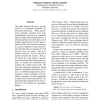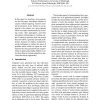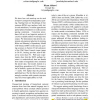ACL
2010
13 years 9 months ago
2010
This paper improves the use of pseudowords as an evaluation framework for selectional preferences. While pseudowords originally evaluated word sense disambiguation, they are now c...
ACL
2010
13 years 9 months ago
2010
We present algorithms for higher-order dependency parsing that are "third-order" in the sense that they can evaluate substructures containing three dependencies, and &qu...
ACL
2010
13 years 9 months ago
2010
In this paper we present a joint content selection and compression model for single-document summarization. The model operates over a phrase-based representation of the source doc...
ACL
2010
13 years 9 months ago
2010
Despite its substantial coverage, NomBank does not account for all withinsentence arguments and ignores extrasentential arguments altogether. These arguments, which we call implic...
ACL
2010
13 years 9 months ago
2010
In this paper we develop a story generator that leverages knowledge inherent in corpora without requiring extensive manual involvement. A key feature in our approach is the relian...
ACL
2010
13 years 9 months ago
2010
We propose a novel self-training method for a parser which uses a lexicalised grammar and supertagger, focusing on increasing the speed of the parser rather than its accuracy. The...
ACL
2010
13 years 9 months ago
2010
We show how web mark-up can be used to improve unsupervised dependency parsing. Starting from raw bracketings of four common HTML tags (anchors, bold, italics and underlines), we ...
ACL
2010
13 years 9 months ago
2010
We present a method for extracting social networks from literature, namely, nineteenth-century British novels and serials. We derive the networks from dialogue interactions, and t...
ACL
2010
2010
Minimized Models and Grammar-Informed Initialization for Supertagging with Highly Ambiguous Lexicons
13 years 9 months ago
We combine two complementary ideas for learning supertaggers from highly ambiguous lexicons: grammar-informed tag transitions and models minimized via integer programming. Each st...
ACL
2010
13 years 9 months ago
2010
In this paper, we present a simple and effective method to address the issue of how to generate diversified translation systems from a single Statistical Machine Translation (SMT)...



